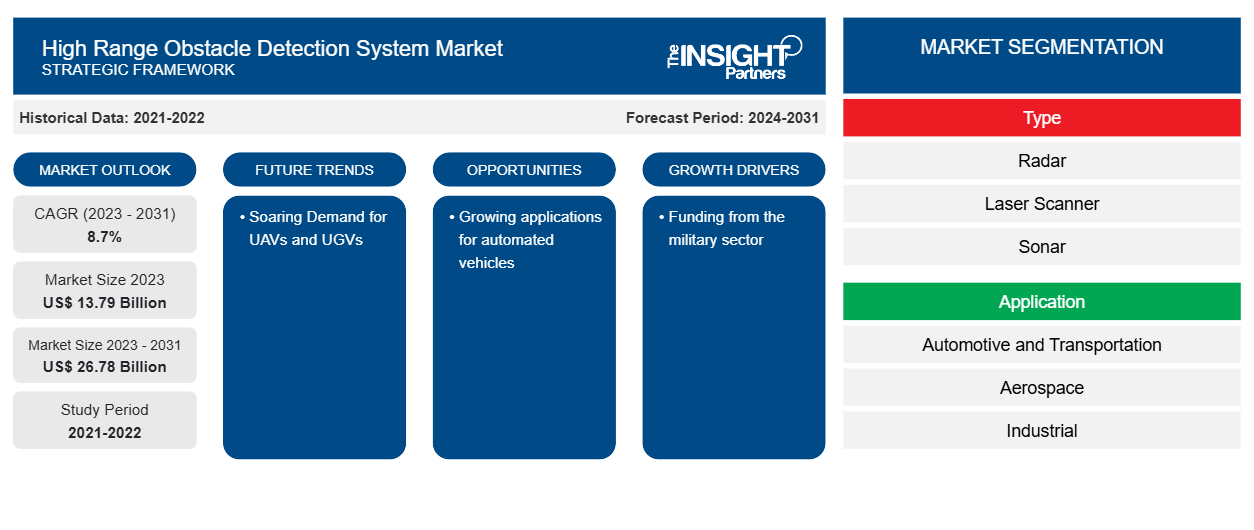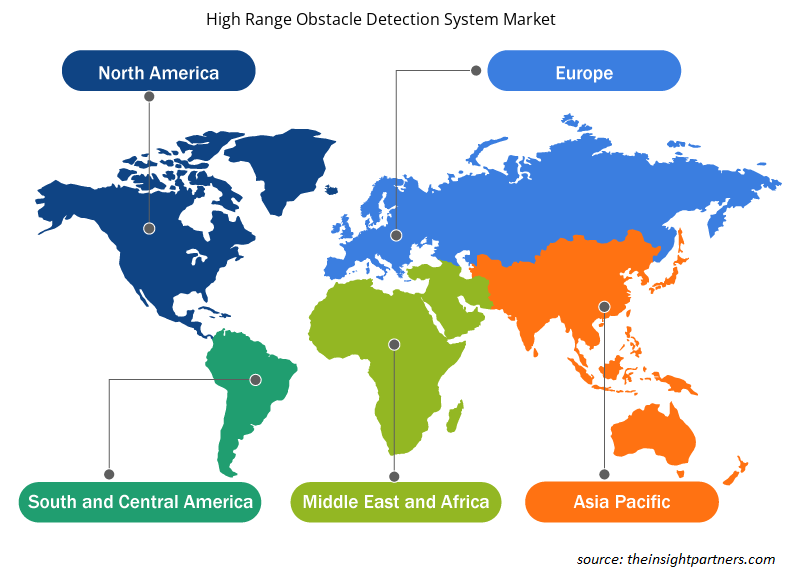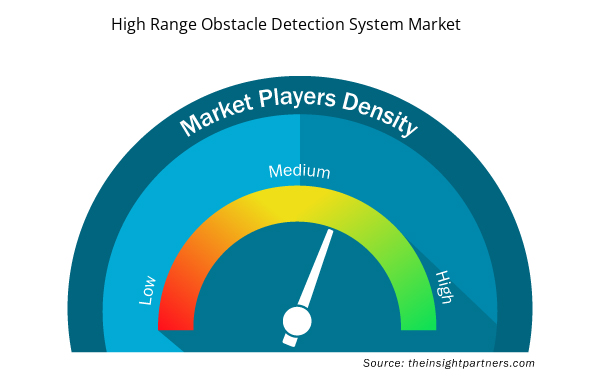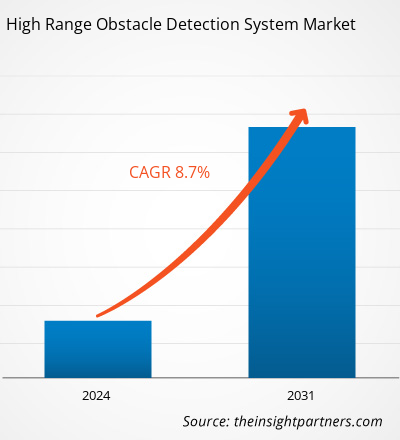The high range obstacle detection system market size is projected to reach US$ 26.78 billion by 2031 from US$ 13.79 billion in 2023. The market is expected to register a CAGR of 8.7% in 2023–2031. The mounting demand for efficient obstacle detection systems in the automotive sector and the adoption of LiDAR technology across various industries are likely to remain key to high range obstacle detection system market trends.
High Range Obstacle Detection System Market Analysis
The global high range obstacle detection system market is expected to expand rapidly due to its application in a variety of industry verticals, including automotive, robotics, aerospace, and defense. Some of the major factors driving the growth of the global high range obstacle detection system market include rising demand for autonomous vehicles and an increased need for collision detection. Technological advancements in sensors and related components are expected to create significant opportunities for market participants.
High Range Obstacle Detection System Market Overview
Reliable high-range obstacle detection is critical for fast-moving, safety-critical platforms such as autonomous cars to respond to hazards in real-time. A high Range Obstacle Detection System detects obstacles such as trees and buildings from a distance. It works by utilizing sensors such as radar, cameras, and lasers to measure the height and objects in the environment and notify the user when an obstacle is detected. These systems are used in a variety of applications, including vehicle and aircraft navigation, military detection, avoidance of landmines and others.
Customize This Report To Suit Your Requirement
You will get customization on any report - free of charge - including parts of this report, or country-level analysis, Excel Data pack, as well as avail great offers and discounts for start-ups & universities
High Range Obstacle Detection System Market: Strategic Insights

- Get Top Key Market Trends of this report.This FREE sample will include data analysis, ranging from market trends to estimates and forecasts.
You will get customization on any report - free of charge - including parts of this report, or country-level analysis, Excel Data pack, as well as avail great offers and discounts for start-ups & universities
High Range Obstacle Detection System Market: Strategic Insights

- Get Top Key Market Trends of this report.This FREE sample will include data analysis, ranging from market trends to estimates and forecasts.
High Range Obstacle Detection System Market Drivers and Opportunities
Funding from the military sector to Favor Market
High range obstacle detection system is a sophisticated detection system that uses both radar and vision technologies to detects obstacles and hazards from a long distance. It is used in military applications, such as drones, ground vehicles, and ships. This system uses advanced sensors that helps to detect obstacles in the real-time. Such advanced technology helps to improve the efficiency of drones, unmanned surface vehicle (USV), and others. For such use of this technology in the military sector, the market players are funded by military to develop technically advanced solutions. For instance, in December 2023, KEF Robotics received funding from the US Department of Defense to develop an AI-enabled obstacle detection solution for US Army tethered drones.
Growing applications for automated vehicles
There is a growing market of automated vehicles and self-driving systems as it poses safer and more efficient transportation. The automated vehicles generate the demand for the obstacle detection system, which further foster the demand for high range obstacle detection systems to gain accurate detection of obstacles. With the adoption of this solution, the vehicle quickly detects the obstacles and react accordingly. This feature enhances the safety of autonomous vehicles.
High Range Obstacle Detection System Market Report Segmentation Analysis
Key segments that contributed to the derivation of the high range obstacle detection system market analysis are type and application.
- Based on the type, the market is segmented into radar, laser scanner, sonar, and LiDAR. The LiDAR segment is expected to grow with the highest CAGR.
- By application, the market is segmented into automotive and transportation, aerospace, industrial, marine, and other applications. The automotive and transportation segment held a larger market share in 2023.
High Range Obstacle Detection System Market Share Analysis by Geography
The geographic scope of the high range obstacle detection system market report is mainly divided into five regions: North America, Asia Pacific, Europe, Middle East & Africa, and South America/South & Central America.
Asia Pacific region is expected to grow with the highest CAGR. The high range obstacle detection market is growing in the region with the rise in the use of industrial robots. The wide application of high range obstacle detection in autonomous vehicles and drones further fosters its market growth.
High Range Obstacle Detection System Market Regional Insights
The regional trends and factors influencing the High Range Obstacle Detection System Market throughout the forecast period have been thoroughly explained by the analysts at Insight Partners. This section also discusses High Range Obstacle Detection System Market segments and geography across North America, Europe, Asia Pacific, Middle East and Africa, and South and Central America.

- Get the Regional Specific Data for High Range Obstacle Detection System Market
High Range Obstacle Detection System Market Report Scope
| Report Attribute | Details |
|---|---|
| Market size in 2023 | US$ 13.79 Billion |
| Market Size by 2031 | US$ 26.78 Billion |
| Global CAGR (2023 - 2031) | 8.7% |
| Historical Data | 2021-2022 |
| Forecast period | 2024-2031 |
| Segments Covered |
By Type
|
| Regions and Countries Covered | North America
|
| Market leaders and key company profiles |
High Range Obstacle Detection System Market Players Density: Understanding Its Impact on Business Dynamics
The High Range Obstacle Detection System Market is growing rapidly, driven by increasing end-user demand due to factors such as evolving consumer preferences, technological advancements, and greater awareness of the product's benefits. As demand rises, businesses are expanding their offerings, innovating to meet consumer needs, and capitalizing on emerging trends, which further fuels market growth.
Market players density refers to the distribution of firms or companies operating within a particular market or industry. It indicates how many competitors (market players) are present in a given market space relative to its size or total market value.
Major Companies operating in the High Range Obstacle Detection System Market are:
- BAE Systems plc
- Blickfeld GmbH
- Collins Aerospace
- Honeywell International Inc.
- ifm electronic gmbh
- LIVOX
Disclaimer: The companies listed above are not ranked in any particular order.

- Get the High Range Obstacle Detection System Market top key players overview
High Range Obstacle Detection System Market News and Recent Developments
The High Range Obstacle Detection System Market
is evaluated by gathering qualitative and quantitative data post primary and secondary research, which includes important corporate publications, association data, and databases. The following is a list of developments in the market:- In May 2023, The Bosch Engineering Center in Cluj announced the installation of a collision warning system developed by Bosch called Tram Forward Collision Warning (TFCW) on a tram that is part of the fleet of the Cluj-Napoca Public Transport Company (CTP). The system assists tram drivers in critical situations by providing audible and visual warnings, thus enhancing safety for tram drivers, passengers, and other traffic participants. The tram collision warning system supports drivers in critical situations by warning them in a timely fashion about obstacles on the tracks, especially in conditions of congested traffic or reduced visibility. This allows drivers to avoid accidents or significantly reduce damage. (Press Release, 2023)
High Range Obstacle Detection System Market Report Coverage and Deliverables
The “High Range Obstacle Detection System Market Size and Forecast (2023–2031)” report provides a detailed analysis of the market covering below areas:
- Market size and forecast at global, regional, and country levels for all the key market segments covered under the scope
- Market dynamics such as drivers, restraints, and key opportunities
- Key future trends
- Detailed PEST/Porter’s Five Forces and SWOT analysis
- Global and regional market analysis covering key market trends, major players, regulations, and recent market developments
- Industry landscape and competition analysis covering market concentration, heat map analysis, prominent players, and recent developments
- Detailed company profiles
- Historical Analysis (2 Years), Base Year, Forecast (7 Years) with CAGR
- PEST and SWOT Analysis
- Market Size Value / Volume - Global, Regional, Country
- Industry and Competitive Landscape
- Excel Dataset



Report Coverage
Revenue forecast, Company Analysis, Industry landscape, Growth factors, and Trends

Segment Covered
Type and Application

Regional Scope
North America, Europe, Asia Pacific, Middle East & Africa, South & Central America

Country Scope
Argentina, Australia, Brazil, Canada, China, France, Germany, India, Italy, Japan, Mexico, Russian Federation, Saudi Arabia, South Africa, South Korea, United Arab Emirates, United Kingdom, United States
Frequently Asked Questions
What is the estimated market size for the global high range obstacle detection system market in 2023?
The global high range obstacle detection system market was estimated to be US$ 13.79 billion in 2023 and is expected to grow at a CAGR of 8.7% during the forecast period 2023 - 2031.
What are the driving factors impacting the global high range obstacle detection system market?
The mounting demand for efficient obstacle detection systems in the automotive sector and the adoption of LiDAR technology across various industries are the major factors that propel the global high range obstacle detection system market.
What are the future trends of the global high range obstacle detection system market?
Soaring Demand for UAVs and UGVs is anticipated to play a significant role in the global high range obstacle detection system market in the coming years.
Which are the key players holding the major market share of the global high range obstacle detection system market?
The key players holding majority shares in the global high range obstacle detection system market are BAE Systems plc, Blickfeld GmbH, Collins Aerospace, Honeywell International Inc., and ifm electronic gmbh.
What will be the market size of the global high range obstacle detection system market by 2031?
The global high range obstacle detection system market is expected to reach US$ 26.78 billion by 2031.
What is the incremental growth of the global high range obstacle detection system market during the forecast period?
The incremental growth expected to be recorded for the global high range obstacle detection system market during the forecast period is US$ 12.99 billion.

 Get Free Sample For
Get Free Sample For